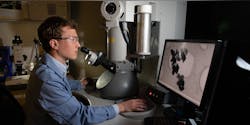Manufacturing Is Critical to Economic Rebound
Main photo: Stephen Aro, PPG group leader, research and development, examines a paint sample at the company’s Global Coatings Innovation Center in Allison Park, Pa.
The U.S. manufacturing sector has established itself as the backbone of economic stability and renewal amid times of crisis or downturn. It is important that candidates in this election, regardless of political affiliation, understand that a strong economic recovery is reliant on a durable manufacturing industry.
In spite of the business disruptions caused by the COVID-19 pandemic earlier in the year, the future for manufacturing looks bright. According to the National Association of Manufacturers (NAM) third quarter 2020 outlook survey, 66% of manufacturer respondents are positive about their own company’s outlook, expecting sales, employment, production growth rate, wages and more to increase at varying levels over the next year.
With this in mind, what is needed to accelerate the role of manufacturing in the renewal of the U.S. economy?
First, the United States needs to invest in and modernize its transportation and infrastructure systems.
The pandemic has placed a spotlight on infrastructure and its critical role to keep supplies moving to meet the needs of Americans across the nation. The current condition of U.S. infrastructure, however, has not kept pace with the growing needs and demand. And, the American Society of Civil Engineers released a report card in 2017 of infrastructure in the country and gave the nation a rating of D+. Without adequate investments, the U.S. is on track to lose 5.8 million jobs by 2040.
Investment in a modern infrastructure system has proven ties to job creation and economic stability, demonstrating its importance to both manufacturers and all Americans alike. This needs to be a top priority for candidates in this election as manufacturers are looking for elected leaders to make it happen.
Candidates must also support programs that help to increase and diversify the talent pipeline needed to sustain the evolving manufacturing landscape. A study by Deloitte and The Manufacturing Institute found that manufacturers will need to hire 4.6 million workers by 2028 and that 2.4 million of those jobs could go unfilled if appropriate steps aren’t taken now to prepare more workers for the next generation of jobs.
At PPG, we know that the manufacturing of tomorrow starts with the students and workforce of today. Within the walls of our manufacturing facilities, offices and research and development sites, employees are at the helm of innovation, pushing the boundaries of what is possible with paints and coatings. When it comes to emerging technologies, our employees are discovering new ways to utilize advanced tools that are creating next-generation advanced manufacturing processes.
In order to remain competitive in a global marketplace, manufacturers also need their elected officials to see immigration reform as essential to U.S. competitiveness worldwide and a pathway for developing diverse talent in the manufacturing sector.
Candidates must address how employment-based visa categories can better represent a range of employment needs. In many cases, the number of applications received from employers far exceed the number of visas available each year. Updating such policies eliminates barriers to retaining qualified applicants while enabling the U.S. to remain competitive.
Finally, candidates must recognize the importance of continuing to advance permanent pro-growth provisions in the tax code and continual assessment of competitiveness of the U.S. tax system.
With the NAM reporting that two-thirds of its members would need to consider reducing investments in the U.S. if tax reform were rolled back, a commitment to tax reform ensures manufacturers have the opportunity to continue to pay forward the benefits.
As the election approaches, our candidates must have confidence in the central role of the manufacturing sector in both combating the economic impacts caused by the COVID-19 pandemic and creating a prosperous future. With the right investments and focus, it will be America’s manufacturers who lead us forward in this historical moment in time.
McGarry is the chairman and CEO of Pittsburgh-based PPG, a leading global manufacturer of paints, coatings and specialty materials.
